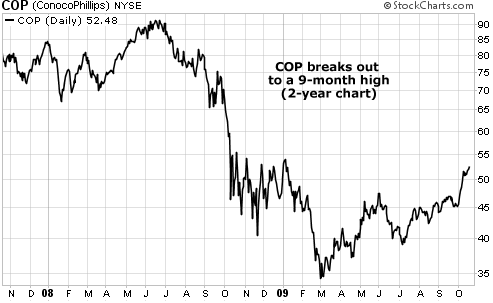| Home | About Us | Resources | Archive | Free Reports | Market Window |
My Favorite Ways to Hold CashBy
Tuesday, October 20, 2009
In yesterday's DailyWealth, we discussed America's huge new appetite for saving cash and paying off debt.
For the first time in years, individuals want cash. The paradox is that at the same time, investors hate cash. The government, the mainstream press, and even most newsletter writers have emphatically discouraged its ownership, leading most investors to dump their cash in favor of stocks, gold, and other noncash assets. With cash so desirable, yet so shunned by investors, I think now's the perfect time to own it. But the thing is, hiding bank notes under your mattress is not a sensible way to invest in cash. The cash doesn't pay you interest, and you run the risk of theft or fire destroying your nest egg. I'm not particularly comfortable leaving my money in a local bank, either. Already, 170 banks have collapsed in this crisis, and thousands more will follow. If I were a banker, my first motivation would be making sure my institution was a safe warehouse for people to deposit their money. I'd trade on this reputation. Profit would be a secondary consideration. But nowadays, depositors don't care about the safety of their deposits. FDIC insurance allows modern bank managers and loan officers to pursue profits without considering their reputations. So naturally, most banks have reached too far for profits, and the worst offenders will eventually collapse. I don't count on FDIC insurance. I worry the government will bankrupt itself in its fight against the recession. When the crunch comes, it won't be able to honor the promises it has made through the FDIC system. So where do I think you should put your cash? The first, absolute safest, cheapest way of storing your cash is to buy Treasury bills. When you buy a Treasury bill, you lend the U.S. government your money for less than one year. These ultra short-term debts of the federal government have virtually no credit risk or interest-rate risk. The downside is, you'll get less than 0.5% interest per year in these instruments. You can buy these bills through your broker, possibly your bank, or visit www.treasurydirect.gov. It's the Treasury's official site for selling its bonds. You can open an account at Treasury Direct and manage your investments directly through the Treasury's website. You'll pay no commissions or trading fees this way, unless you ask the Treasury to sell a bill in the open market before it matures, in which case, it'll charge you a flat $45 fee. You can also buy T-bills on the stock market, using exchange-traded funds. This is a convenient option if you don't feel like opening a new account with the Treasury, or you want to be able to sell at short notice. The iShares Barclays Short Treasury Bond Fund (SHV) holds a basket of the shortest-term T-bills. It has an expense ratio of 0.15%. It has $1.6 billion in assets. This year, its price has fluctuated between a high of $110.47 and a low of $110.18. If you want to earn more interest than T-bills will pay – and have the flexibility of checking – I recommend you open a checking account or take out a CD with EverBank. EverBank promises to pay an interest rate in the top 5% of nationwide interest rates. It doesn't charge checking fees or monthly fees, and it offers even higher "teaser" introductory rates for the first three months. Right now, it pays 2.51% for the first three months and 1.72% thereafter. Steve Sjuggerud and I know Frank Trotter, EverBank's founder. Frank is a prudent banker and his bank is safe. But if it's important to you, the checking account is FDIC-insured. EverBank controls more than $6 billion in assets. Cash is the most contrarian asset in the world right now... and there's huge demand for it at the same time. With economic risk and uncertainty the highest they've been in decades, I recommend you start building a cash pile immediately. Good investing, Tom P.S. I reserved my favorite cash investment for readers of my 12% Letter. You can access your cash any time you want, and it pays 3.7% interest. There's no better way in the world to hold cash than this investment. To learn more about the 12% Letter and how to access my report, click here.
Further Reading:
Why Cash Just Became My Favorite Investment Market NotesBUFFETT'S FAVORITE OIL STOCK IS BREAKING OUT
Today, we look at one of the safest ways to play the new strength in crude oil. We take a stock tip from the world's best investor, Warren Buffett.
Several years ago, Buffett made waves with his purchase of ConocoPhillips (COP), one of the world's largest diversified energy companies. Buffett rarely buys shares in commodity-producing businesses... They simply don't have the stability and pricing power Coca-Cola or Procter & Gamble have. He just thought COP was safe and cheap. Like all energy stocks, COP suffered a huge fall in late 2008. This was when investors were selling everything and the kitchen sink in order to raise cash. COP struck a bottom around $35 per share in March and drifted around $45 this summer. Just this month, it broke out to $50. Despite the recent gains, COP is still cheap. Shares go for around five times cash flow and offer a 3.8% dividend yield... which is why Buffett owns more than 64 million shares of the company. If you're looking to safely get long oil, this is one of the best "guru approved" vehicles around. 
|
In The Daily Crux
Recent Articles
|

